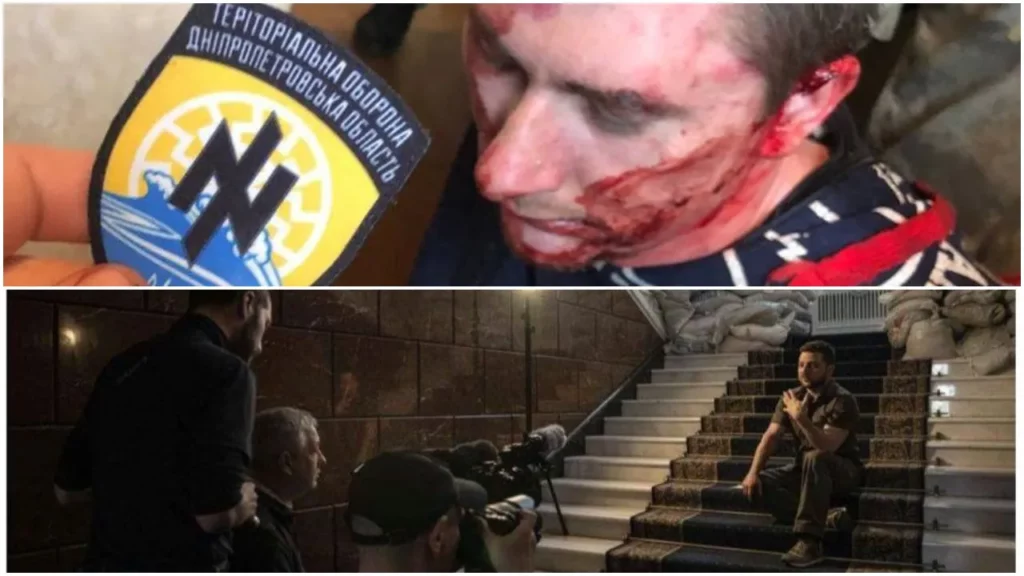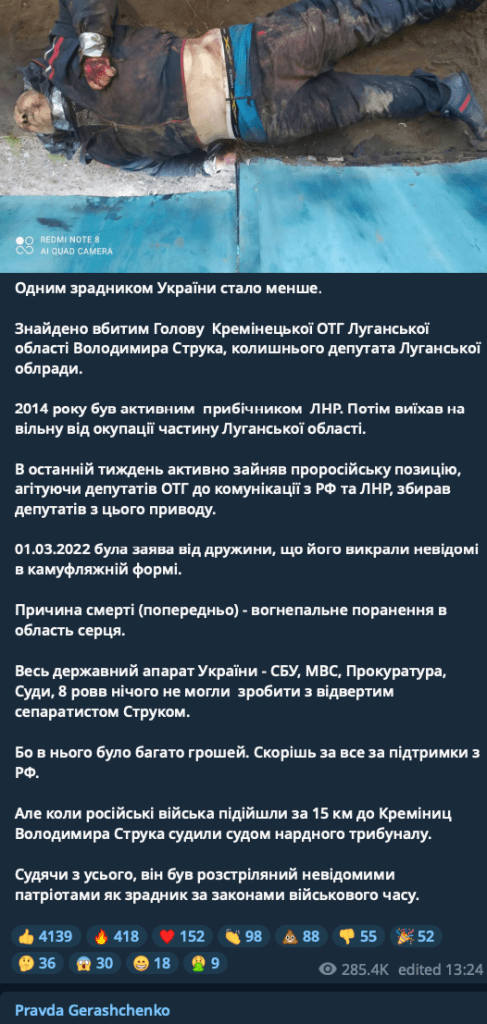“One less Traitor”: Zelensky Oversees Campaign of Assassination, Kidnapping and Torture of Political Opposition
BALKANS AND EASTERN EUROPE, 25 Apr 2022
Max Blumenthal and Esha Krishnaswamy | The Grayzone – TRANSCEND Media Service
17 Apr 2022 – While claiming to defend democracy, Ukraine’s Volodymyr Zelensky has outlawed his opposition, ordered his rivals’ arrest, and presided over the disappearance and assassination of dissidents across the country.

Above: The torture of left-wing activist Alexander Matjuschenko on March 3 in Dnipro, recorded by Azov members.
Below: President Volodymyr Zelensky poses during a media engagement.
Ukrainian President Volodymyr Zelensky has framed his country’s war against Russia as a battle for democracy itself. In a carefully choreographed address to US Congress on March 16, Zelensky stated, “Right now, the destiny of our country is being decided. The destiny of our people, whether Ukrainians will be free, whether they will be able to preserve their democracy.”
US corporate media has responded by showering Zelensky with fawning press, driving a campaign for his nomination for the Nobel Peace Prize and inspiring a flamboyant musical tribute to himself and the Ukrainian military during the 2022 Grammy awards ceremony on April 3.
Western media has looked the other way, however, as Zelensky and top officials in his administration have sanctioned a campaign of kidnapping, torture, and assassination of local Ukrainian lawmakers accused of collaborating with Russia. Several mayors and other Ukrainian officials have been killed since the outbreak of war, many reportedly by Ukrainian state agents after engaging in de-escalation talks with Russia.
“There is one less traitor in Ukraine,” Internal Affairs Ministry advisor Anton Geraschenko stated in endorsement of the murder of a Ukrainian mayor accused of collaborating with Russia.
Zelensky has further exploited the atmosphere of war to outlaw an array of opposition parties and order the arrest of his leading rivals. His authoritarian decrees have triggered the disappearance, torture and even murder of an array of human rights activists, communist and leftist organizers, journalists and government officials accused of “pro-Russian” sympathies.
The Ukrainian SBU security services has served as the enforcement arm of the officially authorized campaign of repression. With training from the CIA and close coordination with Ukraine’s state-backed neo-Nazi paramilitaries, the SBU has spent the past weeks filling its vast archipelago of torture dungeons with political dissidents.
On the battlefield, meanwhile, the Ukrainian military has engaged in a series of atrocities against captured Russian troops and proudly exhibited its sadistic acts on social media. Here too, the perpetrators of human rights abuses appear to have received approval from the upper echelons of Ukrainian leadership.
While Zelensky spouts bromides about the defense of democracy before worshipful Western audiences, he is using the war as a theater for enacting a blood-drenched purge of political rivals, dissidents and critics.
“The war is being used to kidnap, imprison and even kill opposition members who express themselves critical of the government,” a left-wing activist beaten and persecuted by Ukraine’s security services commented this April. “We must all fear for our freedom and our lives.”
Torture and enforced disappearances “common practices” of Ukraine’s SBU
When a US-backed government seized power in Kiev following the Euromaidan regime change operation of 2013-14, Ukraine’s government embarked on a nationwide purge of political elements deemed pro-Russian or insufficiently nationalistic. The passage of “decommunization” laws by the Ukrainian parliament further eased the persecution of leftist elements and the prosecution of activists for political speech.
The post-Maidan regime has focused its wrath on Ukrainians who have advocated a peace settlement with pro-Russian separatists in the country’s east, those who have documented human rights abuses by the Ukrainian military, and members of communist organizations. Dissident elements have faced the constant threat of ultra-nationalist violence, imprisonment, and even murder.
The Ukrainian security service known as the SBU has served as the main enforcer of the post-Maidan government’s campaign of domestic political repression. Pro-Western monitors including the United Nations Office of the High Commission (UN OHCR) and Human Rights Watch have accused the SBU of systematically torturing political opponents and Ukrainian dissidents with near-total impunity.
The UN OHCR found in 2016 that “arbitrary detention, enforced disappearances, torture and ill-treatment of such conflict-related detainees were common practice of SBU… A former Kharkiv SBU officer explained, ‘For the SBU, the law virtually does not exist as everything that is illegal can be either classified or explained by referring to state necessity.”
Yevhen Karas, the founder of the infamous neo-Nazi C14 unit, has detailed the close relationship his gang and other extreme right factions have enjoyed with the SBU. The SBU “informs not only us, but also Azov, the Right Sector, and so on,” Karas boasted in a 2017 interview.
Kiev officially endorses assassinating Ukrainian mayors for negotiating with Russia
Since Russia launched its military operation inside Ukraine, the SBU has hunted down local officials that decided to accept humanitarian supplies from Russia or negotiated with Russian forces to arrange corridors for civilian evacuations.
On March 1, for example, Volodymyr Strok, the mayor of the eastern city of Kreminna in the Ukrainian-controlled side of Lugansk, was kidnapped by men in military uniform, according to his wife, and shot in the heart.
On March 3, pictures of Strok’s visibly tortured body appeared. A day before his murder, Struk had reportedly urged his Ukrainian colleagues to negotiate with pro-Russian officials.
Anton Gerashchenko, an advisor to the Ukrainian Ministry of Internal Affairs, celebrated the mayor’s murder, declaring on his Telegram page (see below): “There is one less traitor in Ukraine. The mayor of Kreminna in Luhansk region, former deputy of Luhansk parliament was found killed.”
According to Geraschenko, Strok had been judged by the “court of the people’s tribunal.”

The Ukrainian official therefore delivered a chilling message to anyone choosing to seek cooperation with Russia: do so and lose your life.
On March 7, the mayor of Gostomel, Yuri Prylipko, was found murdered. Prylipko had reportedly entered into negotiations with the Russian military to organize a humanitarian corridor for the evacuation of his city’s residents – a red line for Ukrainian ultra-nationalists who had long been in conflict with the mayor’s office.
Next, on March 24, Gennady Matsegora, the mayor of Kupyansk in northeastern Ukraine, released a video (below) appealing to President Volodymyr Zelensky and his administration for the release of his daughter, who had been held hostage by agents of the Ukrainian SBU intelligence agency.
Then there was the murder of Denis Kireev, a top member of the Ukrainian negotiating team, who was killed in broad daylight in Kiev after the first round of talks with Russia. Kireev was subsequently accused in local Ukrainian media of “treason.”
President Volodymyr Zelensky’s statement that “there would be consequences for collaborators” indicates that these atrocities have been sanctioned by the highest levels of government.
As of today, eleven mayors from various towns in Ukraine are missing. Western media outlets have been following the Kiev line without exception, claiming that all mayors been arrested by the Russian military. The Russian Ministry of Defense has denied the charge, however, and little evidence exists to corroborate Kiev’s line about the missing mayors.
Zelensky outlaws political opposition, authorizes arrest of rivals and war propaganda blitz
When war erupted with Russia this February, Ukrainian President Volodymyr Zelensky issued a series of decrees formalizing Kiev’s campaign against political opposition and dissident speech.
In a March 19 executive order, Zelensky invoked martial law to ban 11 opposition parties. The outlawed parties consisted of the entire left-wing, socialist or anti-NATO spectrum in Ukraine. They included the For Life Party, the Left Opposition, the Progressive Socialist Party of Ukraine, the Socialist Party of Ukraine, Union of Left Forces, Socialists, the Party of Shariy, Ours, State, Opposition Bloc and the Volodymyr Saldo Bloc.
Openly fascist and pro-Nazi parties like the Azov National Corps were left untouched by the presidential decree, however.
“The activities of those politicians aimed at division or collusion will not succeed, but will receive a harsh response,” President Zelensky stated.
As he wiped out his opposition, Zelensky ordered an unprecedented domestic propaganda initiative to nationalize all television news broadcasting and combine all channels into a single 24 hour channel called “United News” to “tell the truth about war.”
Next, on April 12, Zelensky announced the arrest of his principal political rival, Viktor Medvedchuk, by Ukraine’s SBU security services.
Medvedchuk’s face is clearly bruised, apparently a result of beatings from Zelensky’s SBU goons. Don’t expect any questions about this image to appear in the pages of the NYT or in CNN’s 24 hour media circus. Can’t allow anything to undermine the pro-war narrative. pic.twitter.com/A0qhhmeaj8
— Dan Cohen (@dancohen3000) April 12, 2022
The founder of the second largest party in Ukraine, the now-illegal Patriots for Life, Medvedchuk is the de facto representative of the country’s ethnic Russian population. Though Patriots for Life is regarded as “pro-Russia,” in part because of his close relations with Vladimir Putin, the new chairman of the party has condemned Russia’s “aggression” against Ukraine.
Members of the state-sponsored neo-Nazi Azov Battalion’s National Corps attacked Medvedchuk’s home in March 2019, accusing him of treason and demanding his arrest.
In August 2020, Azov’s National Corps opened fire on a bus carrying representatives of Medvedchuk’s party, wounding several with rubber-coated steel bullets.
Zelensky’s administration escalated the assault on his top opponent in February 2021 when he shuttered several media outlets controlled by Medvedchuk. The US State Department openly endorsed the president’s move, declaring that the United States “supports Ukrainian efforts to counter Russia’s malign influence…”
Three months later, Kiev jailed Medvedchuk and charged him with treason. Zelensky justified locking away his leading rival on the grounds that he needed to “fight against the danger of Russian aggression in the information arena.”
Medvedchuk escaped house arrest at the onset of the war between Russia and Ukraine, but is a captive once again, and may be used as collateral for a post-war prisoner swap with Russia.
Under Zelensky’s watch, “the war is being used to kidnap, imprison and even kill opposition members”
Since Russian troops entered Ukraine on February 24, Ukraine’s SBU security service had been on a rampage against any and all iterations of internal political opposition. Leftist Ukrainian activists have faced particularly harsh treatment, including kidnapping and torture.
This March 3 in the city of Dnipro, SBU officers accompanied by Azov ultra-nationalists raided the home of activists with the Livizja (Left) organization, which has organized against social spending cuts and right-wing media propaganda. While one activist said the Azov member “cut my hair off with a knife,” the state security agents proceeded to torture her husband, Alexander Matjuschenko, pressing a gun barrel to his head and forcing him to repeatedly belt out the nationalist salute, “Slava Ukraini!”
“Then they put bags over our heads, tied our hands with tape and took us to the SBU building in a car. There they continued to interrogate us and threatened to cut off our ears,” Matjuschenko’s wife told the leftist German publication Junge Welt.
The Azov members and SBU agents recorded the torture session and published images of Matjuschenko’s bloodied face online.

Matjuschenko was jailed on the grounds that he was “conducting an aggressive war or military operation,” and now faces 10 to 15 years in prison. Despite enduring several broken ribs from the beating by state-backed ultra-nationalists, he has been denied bail. Meanwhile, dozens of other leftists have been jailed on similar charges in Dnipro.
Among those targeted by the SBU were Mikhail and Aleksander Kononovich, members of the outlawed Leninist Communist Youth Union of Ukraine. Both were arrested and jailed on March 6 and accused of “spreading pro-Russian and pro-Belarusian views.”
In the following days, the SBU arrested broadcast journalist Yan Taksyur and charged him with treason; human rights activist Elena Berezhnaya; Elena Viacheslavova, a human rights advocate whose father, Mikhail, was burned to death during the May 2, 2014 ultra-nationalist mob attack on anti-Maidan protesters outside the Odessa House of Trade Unions; independent journalist Yuri Tkachev, who was charged with treason, and an untold number of others; disabled rights activist Oleg Novikov, who was jailed for three years this April on the grounds that he supported “separatism.”
The list of those imprisoned by Ukraine’s security services since the outbreak of war grows by the day, and is too extensive to reproduce here.
______________________________________________
 Max Blumenthal is an award-winning journalist and the author of several books, including best-selling Republican Gomorrah, Goliath, The Fifty One Day War, and The Management of Savagery. He has produced print articles for an array of publications, many video reports, and several documentaries, including Killing Gaza. Blumenthal founded The Grayzone in 2015 to shine a journalistic light on America’s state of perpetual war and its dangerous domestic repercussions.
Max Blumenthal is an award-winning journalist and the author of several books, including best-selling Republican Gomorrah, Goliath, The Fifty One Day War, and The Management of Savagery. He has produced print articles for an array of publications, many video reports, and several documentaries, including Killing Gaza. Blumenthal founded The Grayzone in 2015 to shine a journalistic light on America’s state of perpetual war and its dangerous domestic repercussions.
![]() Esha Krishnaswamy is the host of the historicly podcast. She has also written for FAIR, critiquing corporate media’s coverage of international events.
Esha Krishnaswamy is the host of the historicly podcast. She has also written for FAIR, critiquing corporate media’s coverage of international events.
Tags: Anti-war, Biden, Eastern Europe, European Union, NATO, Proxy War, Putin, Russia, Security, USA, Ukraine, Violent conflict, Warfare
DISCLAIMER: The statements, views and opinions expressed in pieces republished here are solely those of the authors and do not necessarily represent those of TMS. In accordance with title 17 U.S.C. section 107, this material is distributed without profit to those who have expressed a prior interest in receiving the included information for research and educational purposes. TMS has no affiliation whatsoever with the originator of this article nor is TMS endorsed or sponsored by the originator. “GO TO ORIGINAL” links are provided as a convenience to our readers and allow for verification of authenticity. However, as originating pages are often updated by their originating host sites, the versions posted may not match the versions our readers view when clicking the “GO TO ORIGINAL” links. This site contains copyrighted material the use of which has not always been specifically authorized by the copyright owner. We are making such material available in our efforts to advance understanding of environmental, political, human rights, economic, democracy, scientific, and social justice issues, etc. We believe this constitutes a ‘fair use’ of any such copyrighted material as provided for in section 107 of the US Copyright Law. In accordance with Title 17 U.S.C. Section 107, the material on this site is distributed without profit to those who have expressed a prior interest in receiving the included information for research and educational purposes. For more information go to: http://www.law.cornell.edu/uscode/17/107.shtml. If you wish to use copyrighted material from this site for purposes of your own that go beyond ‘fair use’, you must obtain permission from the copyright owner.
Read more
Click here to go to the current weekly digest or pick another article:
BALKANS AND EASTERN EUROPE: